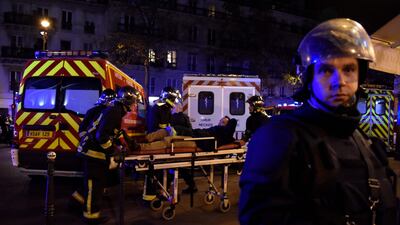The number of people killed in extremist attacks declined for the second successive year in 2016 but more countries were affected, according to the Global Terrorism Index (GTI) released on Wednesday.
Its report, produced by Australia's Institute for Economics & Peace, found there were 25,673 deaths last year as a result of terrorist attacks — down 22 per cent from a 2014 peak.
It noted significant decreases in Syria, Pakistan and Afghanistan.
However, 77 countries experienced at least one lethal attack, more than at any time in the 17-year history of the Global Terrorism Database, on which it is based.
The data set, collated by America's University of Maryland, is considered the most comprehensive of its kind.
The GTI called the falling victim numbers the "main positive finding" and "a turning point in the fight against radical Islamist extremism".
It reported the biggest improvement in Nigeria, where terrorism deaths attributed to Boko Haram fell by 80 per cent last year.
But deaths attributed to ISIL increased by nearly half in 2016, with the majority of the rise — 40 per cent — in Iraq.
The GTI found "disturbing" trends in the worldwide spread of terrorism.
A dozen more countries were the victim of a deadly strike last year than in 2015.
The report's authors also warned of the potential for ISIL fighters from Iraq and Syria to join new radical offshoots in other countries.
In Afghanistan, they described the picture as "complex" in 2016, as the Taliban reduced attacks against civilians but stepped up conflict with government forces.
In Europe and other developed countries, it was the deadliest year for terrorism since 1988, excluding the September 11 attacks in 2001, according to the GTI.
It blamed ISIL activity for the continued spike there, with 75 per cent of terrorist-related deaths in these countries directed or inspired by the organisation since 2014.
"There has been a general shift towards simpler attacks against non-traditional and softer civilian targets," the authors noted.
However, they also found the ISIL's "diminishing capacity" had led to a sharp drop in the number of deaths in the first half of 2017.
Conflict, drought, famine
Estimates of the number of deaths caused by the famine range from 400,000 to 1 million, according to a document prepared for the UK House of Lords in 2024.
It has been claimed that the policies of the Ethiopian government, which took control after deposing Emperor Haile Selassie in a military-led revolution in 1974, contributed to the scale of the famine.
Dr Miriam Bradley, senior lecturer in humanitarian studies at the University of Manchester, has argued that, by the early 1980s, “several government policies combined to cause, rather than prevent, a famine which lasted from 1983 to 1985. Mengistu’s government imposed Stalinist-model agricultural policies involving forced collectivisation and villagisation [relocation of communities into planned villages].
The West became aware of the catastrophe through a series of BBC News reports by journalist Michael Buerk in October 1984 describing a “biblical famine” and containing graphic images of thousands of people, including children, facing starvation.
Band Aid
Bob Geldof, singer with the Irish rock group The Boomtown Rats, formed Band Aid in response to the horrific images shown in the news broadcasts.
With Midge Ure of the band Ultravox, he wrote the hit charity single Do They Know it’s Christmas in December 1984, featuring a string of high-profile musicians.
Following the single’s success, the idea to stage a rock concert evolved.
Live Aid was a series of simultaneous concerts that took place at Wembley Stadium in London, John F Kennedy Stadium in Philadelphia, the US, and at various other venues across the world.
The combined event was broadcast to an estimated worldwide audience of 1.5 billion.
What is blockchain?
Blockchain is a form of distributed ledger technology, a digital system in which data is recorded across multiple places at the same time. Unlike traditional databases, DLTs have no central administrator or centralised data storage. They are transparent because the data is visible and, because they are automatically replicated and impossible to be tampered with, they are secure.
The main difference between blockchain and other forms of DLT is the way data is stored as ‘blocks’ – new transactions are added to the existing ‘chain’ of past transactions, hence the name ‘blockchain’. It is impossible to delete or modify information on the chain due to the replication of blocks across various locations.
Blockchain is mostly associated with cryptocurrency Bitcoin. Due to the inability to tamper with transactions, advocates say this makes the currency more secure and safer than traditional systems. It is maintained by a network of people referred to as ‘miners’, who receive rewards for solving complex mathematical equations that enable transactions to go through.
However, one of the major problems that has come to light has been the presence of illicit material buried in the Bitcoin blockchain, linking it to the dark web.
Other blockchain platforms can offer things like smart contracts, which are automatically implemented when specific conditions from all interested parties are reached, cutting the time involved and the risk of mistakes. Another use could be storing medical records, as patients can be confident their information cannot be changed. The technology can also be used in supply chains, voting and has the potential to used for storing property records.
Moon Music
Artist: Coldplay
Label: Parlophone/Atlantic
Number of tracks: 10
Rating: 3/5

